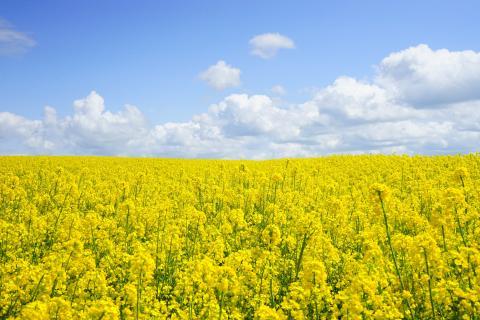
If seasonal allergies and sniffles are an annual bane for you, then maybe you should look towards the ancient texts of Ayurveda for some alleviation…
Ayurveda has a unique outlook on allergies and why we get them. According to many texts, when the food we eat is not digested properly, Ama is created. Ama is undigested food that literally turns toxic and starts to accumulate in the digestive tract. When lifestyle and diet are unhealthy and contra-indicatory with the dosha of a person (vata, pitta, or kapha), Ama increases. Then it can travel within the body and lodge in other organs, vessels, and cavities. When a lot of Ama is stored within the body, it turns into a reactive toxin called Amavisha. This Amavisha reacts badly when it comes into contact with outward influences like a change of weather, pollen, harsh temperatures, or even extreme food which is spicy, hot, cold, or heavy, or too rich in certain nutrients. And when Amavisha reacts, the allergy occurs in the form of seasonal sniffles, fever, sore throats, hives, rashes, or more…
This Amavisha needs to be thrown out of the body with the right diet and exercise—else the allergies will flare up even more the next time. Ayurveda says that detoxification is key to get rid of allergies. Now, this may be true or not, but Ayurveda does offer plenty common-sense cures for allergy sufferers. You may want to try some of them.
Avoid The Allergen
This is not a cure for the allergy in itself, but if and when your allergy flares up big time, the first thing you need to do is to stop coming into contact with that allergen. At least until Ayurveda or any other medication that you take eliminates the allergy itself. So till then, figure out what is making you sneeze or itch or cough or whatever and avoid it. Don’t eat or drink that allergen and if the pollen is your Achilles, wear a cloth mask over your nose and mouth when you step out.
Balance Your Doshas
It’s easy to find out which dosha you are, and how to balance it to counteract any food-related conditions you might be experiencing, including allergies. Eating for your dosha as per the six tastes of Ayurveda may help in alleviating the symptoms of allergies and slowly help dissipate the allergy itself:
- Vata Dosha Diet: Avoid bitter, astringent, and pungent tasting foods, and include more sweet, salty, and sour foods in your diet. Eat warm and heavy foods and avoid anything cold. Starchy veggies, ripe fruits, and ghee as well as jaggery and molasses are good for the vata dosha—anything too processed and white isn’t. Mild spices work best.
- Pitta Dosha Diet: Include bitter, sweet, and astringent tastes but avoid pungent, sour, and salty foods. Steamed veggies and raw foods are good for you, as is warm milk and ghee. Do not overindulge in hot foods, cheeses, or yogurt. Cooling spices will work for you and use honey as a sweetener.
- Kapha Dosha Diet: Include more pungent, bitter, and astringent tastes but avoid sweet, sour, or salty foods. All ripe fruits are good except bananas, and do not overindulge in heavy foods or dairy products. Use little to no oil, though ghee is okay. Raw honey as a sweetener and strong spices work best for you to clear up those sinuses.
Detoxify When Seasons Change
At the end of every season, it’s advisable to detoxify your system by eating light and seasonal foods and warm liquids such as soups and non-milky teas. The idea is not to starve your body of nutrients, but basically wash away all the wrong eating of that season—like an internal spring clean. Keep your diet light and as oil-free as possible, with a little ghee added to your food if it’s the start of winter, and a little olive oil if it’s summer. Stay away from non-vegetarian food for a while, and if it’s the onset of winter, do have warm milk but in summers, make sure it’s yogurt. Your carbs need to be as whole as possible and add in all the fresh fruits and nuts of the season to your table.
Eliminate Dairy
Ayurveda is almost vegan in its belief and tells you that most dairy products often aggravate doshas and exacerbate any allergies. If you must, a glass of hot milk or room-temperature yogurt is fine, but cheeses and creams become a strict no-no. Considering that more and more people are becoming lactose intolerant, Ayurveda might have a point here.
Eat More Warm, Cooked Foods
Eating raw is good for your health to a point, but only if your source is organic and additive-free, and only in the summers. In winter or even in fall, spring, and rain, your food should be warm (not piping hot!) and freshly cooked with mild spices that aid digestion. Ginger, turmeric, cumin, garlic, cinnamon, and black pepper all aid in digestion. Think comfort food—healthy and mild.
Use Nasya or Neti Pots
If your sinuses tend to react badly to pollen, the use of herb oil applied inside your nostrils (nasya) or the rinsing out of your sinuses (neti pot) with saline or herb infusions is a good idea. But do this under the guidance of a practitioner and do follow all instructions.
Exercise & Breathing Techniques
Pranayama is the yogic way of breathing and basically not only does it teach you to breathe right to get all the oxygen you need from the air, it also helps clear out your sinus cavities and air spaces—thus detoxifying your lungs on an everyday basis. Exercise too helps in the removal of toxins and your exercise may be yoga, the gym, or a brisk walk. The idea is to get moving and get the blood pumping.
Most of this list is the same as most health practitioners will tell you—and Ayurveda is basically the science of life and existence. So do give these tips a whirl!








